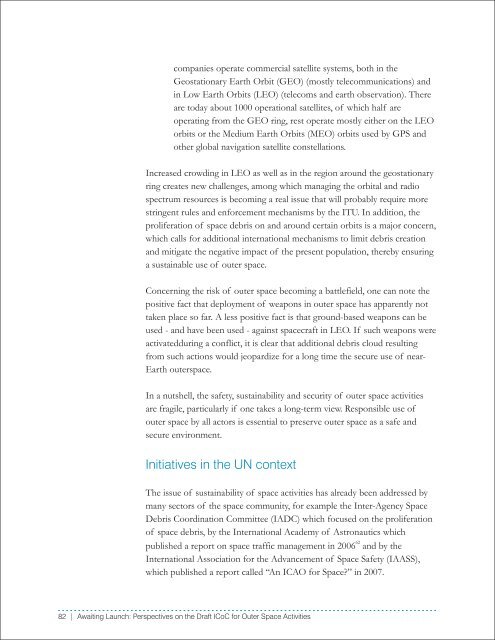AwaitingLaunch_1397728623369
AwaitingLaunch_1397728623369
AwaitingLaunch_1397728623369
Create successful ePaper yourself
Turn your PDF publications into a flip-book with our unique Google optimized e-Paper software.
companies operate commercial satellite systems, both in the<br />
Geostationary Earth Orbit (GEO) (mostly telecommunications) and<br />
in Low Earth Orbits (LEO) (telecoms and earth observation). There<br />
are today about 1000 operational satellites, of which half are<br />
operating from the GEO ring, rest operate mostly either on the LEO<br />
orbits or the Medium Earth Orbits (MEO) orbits used by GPS and<br />
other global navigation satellite constellations.<br />
Increased crowding in LEO as well as in the region around the geostationary<br />
ring creates new challenges, among which managing the orbital and radio<br />
spectrum resources is becoming a real issue that will probably require more<br />
stringent rules and enforcement mechanisms by the ITU. In addition, the<br />
proliferation of space debris on and around certain orbits is a major concern,<br />
which calls for additional international mechanisms to limit debris creation<br />
and mitigate the negative impact of the present population, thereby ensuring<br />
a sustainable use of outer space.<br />
Concerning the risk of outer space becoming a battlefield, one can note the<br />
positive fact that deployment of weapons in outer space has apparently not<br />
taken place so far. A less positive fact is that ground-based weapons can be<br />
used - and have been used - against spacecraft in LEO. If such weapons were<br />
activatedduring a conflict, it is clear that additional debris cloud resulting<br />
from such actions would jeopardize for a long time the secure use of near-<br />
Earth outerspace.<br />
In a nutshell, the safety, sustainability and security of outer space activities<br />
are fragile, particularly if one takes a long-term view. Responsible use of<br />
outer space by all actors is essential to preserve outer space as a safe and<br />
secure environment.<br />
Initiatives in the UN context<br />
The issue of sustainability of space activities has already been addressed by<br />
many sectors of the space community, for example the Inter-Agency Space<br />
Debris Coordination Committee (IADC) which focused on the proliferation<br />
of space debris, by the International Academy of Astronautics which<br />
62<br />
published a report on space traffic management in 2006 and by the<br />
International Association for the Advancement of Space Safety (IAASS),<br />
which published a report called “An ICAO for Space?” in 2007.<br />
82 | Awaiting Launch: Perspectives on the Draft ICoC for Outer Space Activities








